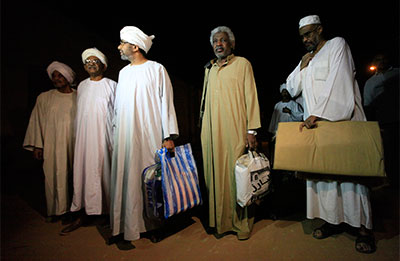In a return to old tactics, the National Intelligence and Security Services (NISS) in Sudan have resumed strict pre-publication censorship.
Last year, I wrote on the CPJ blog that the NISS had adopted a new censorship strategy by attempting to bankrupt newspapers through repeated confiscations printed editions. Each confiscation could cost a newspaper up to $5,000 in printing costs, even without factoring in other operational expenses.
But now, the NISS has returned to its former strategy of censoring stories before they are ever printed. Over the past few months, NISS agents have telephoned editorial staffs of newspapers and asked them not to report on specific topics, such as war, government violations in Darfur, the International Criminal Court, and human rights violations.
Sudanese journalists know these topics are redlines, or taboos they are prohibited from delving into and reporting on. Without any legal basis, the NISS has historically suspended many journalists and columnists after they crossed redlines in the course of practicing their profession. In addition, the NISS banned the critical newspaper Al-Midan for a year last year without a court order, and stopped Al-Tayar last June without citing any reason.
The NISS has intensified its censorship campaign since April 3. NISS agents have resumed showing up at newspapers’ offices every evening to see prototype editions of the papers to review and delete topics they do not like, a practice lacking any legal justification.
Ironically, the NISS censorship returned just after President Omar al-Bashir delivered a speech reiterating his commitment to restore and expand freedoms and inviting political forces and opposition parties to engage in an all-inclusive dialogue to reach a national consensus.
At the opening session of the National Assembly on April 1, al-Bashir said, “We today announce a decision to release all the political detainees and we renew our commitment to create a climate conducive for dialogue for all the political forces.” The next night, the NISS resumed the imposition of strict pre-publication censorship on newspapers and mass media.
A journalist for the independent newspaper Al-Ayaam said security agents come to the newspaper’s offices every evening and ask for a prototype edition to vet, deleting any critical articles that discuss crucial issues. Journalists from several other newspapers confirmed the return of prior censorship last week, including Al-Khartoum, Al-Sudani, and Al-Sahafa.
On April 3, the editor-in-chief of the independent daily Al-Sahafa, Al-Nour Ahmed al-Nour, said the NISS notified him that he was suspended from his position. They threatened to shut down the newspaper for good if he resisted. The next day, al-Nour’s name was already removed from the paper’s masthead.
Al-Nour said two NISS agents came to his office and notified him that he was suspended “because I had insulted a member of these apparatuses.” He said he believed that the decision might be related to his ongoing protests against the strict newspaper censorship.
That same day, the NISS also summoned Al-Jazeera’s bureau chief, al-Masalami Kabbashi, for questioning.
The Sudanese authorities have in the past banned many journalists from writing, but this is the first time an editor-in-chief of a newspaper was suspended. In protest of this unprecedented move, the Sudanese Journalists Network held a strike on Monday in front of Al-Sahafa‘s headquarters in Khartoum. Even the government-run press council threatened to disband because of NISS interference, Agence France Press reported.
Of course, a return to prior censorship does not mean the NISS will no longer restrict the press in other ways. For example, the NISS confiscated the April 9 edition version of the Arabic daily Al-Ahram al-Youm without explanation. The paper is considered close to the government, and its editor-in-chief is a former government minister.
It is not yet clear, then, whether the recent return to pre-publication censorship represents a long-term strategic shift or just a short-term resort to a tried and true method. What is clear, however, is that the Sudanese government is intent on censoring journalists, one way or another.
[Reporting from Khartoum]
